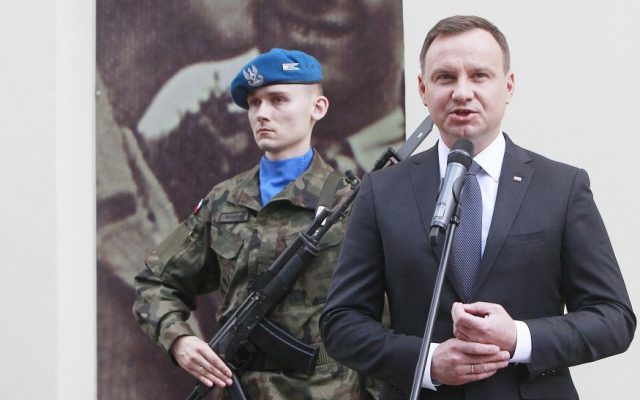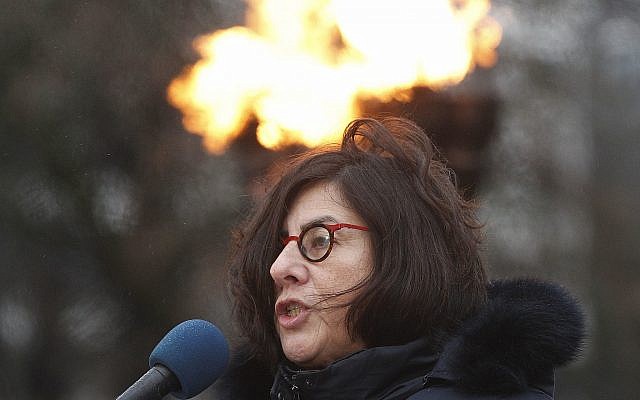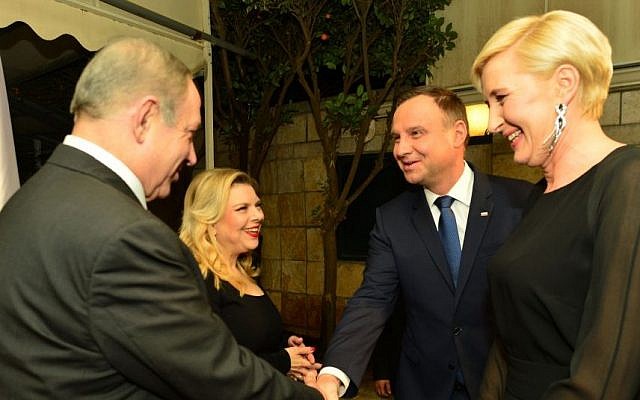‘We absolutely can’t back down,’ Andrzej Duda says, as Israel’s envoy to Warsaw meets with his top aide regarding legislation

Poland’s Andrzej Duda said Monday he was “flabbergasted” by Israel’s “violent and very unfavorable reaction” to a bill that criminalizes blaming Poles for atrocities during the Holocaust.
“We absolutely can’t back down. We have the right to defend the historical truth,” he told public broadcaster TVP.
In a fiery speech earlier in the day, he insisted there was “no systematic participation of the Polish nation or the Polish state (in exile) in the Holocaust, but the Polish resistance and Polish state (in exile) fought the Holocaust in an organized and systemic way.”
However, he did acknowledge that “there were wicked people (Poles) who sold their neighbors for money, but it was not the Polish nation, it was not an organized action… There were also cases of Poles giving up their lives to save their Jewish neighbors.”
Duda’s remarks came as Israel’s ambassador in Warsaw, Anna Azari, met with Duda’s cabinet chief, as part of the efforts to resolve the row over the legislation, although Warsaw has signaled it will not change the bill.
During the meeting, Azari reiterated Israel’s concern that the legislation violates freedom of speech and would limit the discourse surrounding the Holocaust in Poland and its victims, the Foreign Ministry said.
Krzysztof Szczerski told Azari that Poland sees the bill as necessary to prevent Poles and Poland being blamed for Nazi crimes, according to the ministry.
Szczerski characterized the talk as “difficult and frank,” and said he was critical of the reaction in Israel to the legislation approved by the lower house of Poland’s parliament Friday.

It also said a joint team would meet on the matter. The Prime Minister’s Office said on Sunday that Prime Minister Benjamin Netanyahu and his Polish counterpart, Mateusz Morawiecki, held talks and “agreed to immediately open a dialogue between staffs of the two countries, in order to try and reach an understanding over the legislation.”
Netanyahu has pilloried the legislation, which prescribes prison time for referring to “Polish death camps,” and criminalizes the mention of Polish complicity in Nazi crimes, as “distortion of the truth, the rewriting of history and the denial of the Holocaust.”
But two hours after the Prime Minister’s Office issued its statement, Polish government spokesperson Joanna Kopcińska tweeted: “Prime Minister @MorawieckiM talked today with Prime Minister Benjamin Netanyahu about the current Polish-Israeli relations and historical conditions. It was agreed that there will be a dialogue between the teams of both countries. However the conversation will not concern sovereign decisions of the Polish parliament.”
Israel’s Foreign Ministry downplayed her tweet, saying her view does not represent the Polish government.
However, her statement and Duda’s comments seem to indicate that Israel will not have any influence on reworking the law, which Netanyahu and other Israeli officials have demanded be fixed.

The bill, passed by the lower house of the Polish parliament on Friday, still needs approval from Poland’s Senate and president. Still, it marks a dramatic step by the nationalist government to enforce its official stance that all Poles were heroes during the war. Historians say many Poles collaborated with the Nazis and committed heinous crimes.
The Israeli delegation to the bilateral talks will be headed by Foreign Ministry director Yuval Rotem, the ministry said Monday. Israel does not currently have a dedicated foreign minister, with Netanyahu taking on the role in addition to other duties.
On Sunday, Israel’s Foreign Ministry summoned Poland’s deputy ambassador to express Israel’s opposition to the bill, and said it expects the draft to be amended before final approval.
Polish officials claim the law aims not to “whitewash,” but “to safeguard” history.
The legislation has still sparked outrage in Israel, with some lawmakers accusing the Polish government of outright Holocaust denial, as the world marked International Holocaust Remembrance Day on Saturday.
“Everybody knows that many, many thousands of Poles killed or betrayed their Jewish neighbors to the Germans, causing them to be murdered,” said Efraim Zuroff, a prominent historian on the Holocaust and the Eastern Europe director of the Simon Wiesenthal Center. “The Polish state was not complicit in the Holocaust, but many Poles were.”
As reported by The Times of Israel
